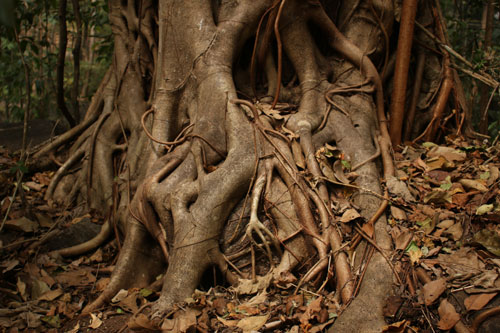

The KFRI Arboretum is a living laboratory, including trees and lianas, which acts as an outreach, teaching, and research facility dedicated to preserving the beauty and ecological functions of our biodiversity hotspot. Located on the Peechi main campus, it was developed during 2003-2008 in an area of about 5 hectares. The present holding of the Arboretum is 3200 accessions belonging to 178 species under 50 families and 128 genera, with more than 50 taxa endemic to southern Peninsular India.
The arboretum is maintained with grid maps with markings of the location details of each of the live collections. The Arboretum is recognized internationally by Index Seminum with ID No. 1518. It is also enlisted in the National Network of Botanical Gardens in India.
The Arboretum promises to be a rewarding experience for visiting students, especially biology students. Among the 178 taxa in the arboretum, there are two gymnosperms, and the 176 are angiosperms. Among the angiosperms, 162 taxa are dicotyledons belonging to 118 genera, and 47 families and monocotyledons are represented by 14 species of 3 genera and two families.
One of the exciting features of KFRI arboretum is the collection of Myristica swamps, the evergreen, water-tolerant trees considered as the most primitive of the flowering plants or "living fossils" on earth. This vanishing ecosystem is now primarily confined to 53 patches in the Kulathupuzha and Anchal forest ranges and the Shendurney Wildlife Sanctuary in Kerala. The characteristic feature of the Myristica swamps is the abundance of trees belonging to the family Myristicaceae, which consists of two main species, viz: Myrisitica fatua and Gymnacranthera farquhariana. The swampy trees like Myristica fatua (Kotthapanu), Myristica beddomei (Pathiripoovu), Myristica malabarica (Ponnampayin), Gymnacranthera farquhariana (Undappayin) are conserved in the collection of KFRI arboretum representing different populations.
The live collection at the KFRI Arboretum is not just a conservatory of rare species, but also a testament to our commitment to biodiversity conservation. With more than 3000 trees, it serves as a ready source of propagules for eco-restoration programmes. For researchers, the arboretum offers a wealth of opportunities, from taxonomical and biotechnological studies like DNA barcoding, to silvicultural, ecological, and synecological studies. The collection also facilitates the conservation of species, saving them from rarity and extinction in their natural habitats and promoting nature education programmes.
Some of the important Southern Peninsular Indian endemic species representation in the Arboretum is Actinodaphne malabarica (Malavirinji); Aglaia barberi (Chuvanna-akil), Aglaia lawii (Karakil), Alstonia venenata (Theeppala), Artocarpus hirsutus (Ayani), Baccaurea courtallesnsis (Mootilpazham), Beilschmiedia wightii (Morakutthi), Cinnamomum malabatrum (Vayana), Cordia wallichii (Cheruthekku), Diospyros bourdillonii (Kakkakarimaram), Diospyros paniculata (Karivella), Dysoxylum malabaricum (Vellakil), Palaquium ellipticum (Pali), Polyalthia fragrans, Semecarpus auriculata, Semecarpus travancorica, Syzygium palghatense, Syzygium travancoricum, Terminalia paniculata, Vateria indica, Vateria macrocarpa.
Arboretum
Kerala Forest Research Institute
Peechi P.O, Thrissur District, Kerala - 680653, India.
Tel: +91-487-2690382
e-mail: sreekumar@kfri.res.in